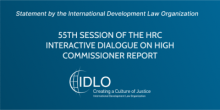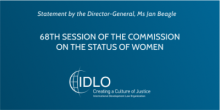Hague Setting for Wide-Ranging Rule of Law Debate
The rule of law is emerging as one of the most pressing issues of this century. It is a cornerstone of peace, security, justice and development.

Gender inequality is an affront to human dignity, a challenge to the rule of law and an obstacle to development. Denying women of their rightful place in society – by depriving them of equal access to education, justice or livelihood – means robbing societies of the talent and potential of half of their members. In securing every social need from peace to food, the role of women has been shown to be paramount.
Although gender equality is increasingly a feature of national Constitutions, the law often continues to restrict women's rights and freedoms, dictates their submission to male relatives, or limits what they may own or inherit.
The rule of law is emerging as one of the most pressing issues of this century. It is a cornerstone of peace, security, justice and development.

Statement by International Development Law Organization (IDLO)

Statement by the Director-General, Ms Jan Beagle











|
Publication
|
|
Policy Statements
|